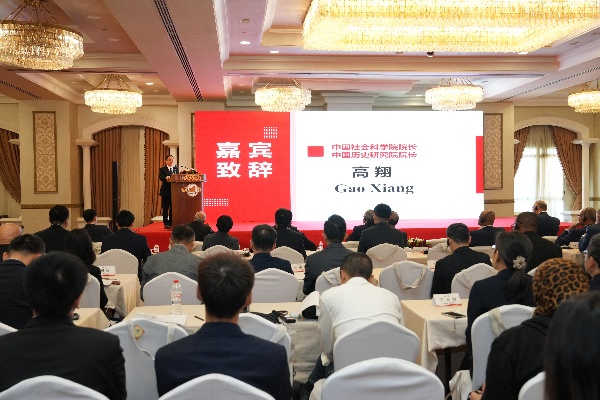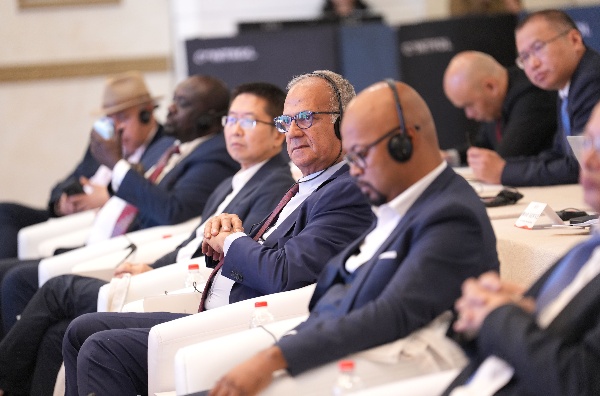


4th Conference on Dialogue Between Chinese and African Civilizations held in Ismailia, Egypt
CAIRO—The 4th Conference on Dialogue Between Chinese and African Civilizations was successfully held on April 16 in Ismailia, Egypt, under the theme “The Modern Value of Classical Wisdom: Insights and Reflections from Ancient Chinese and African Civilizations on Contemporary Global Challenges.” Over 100 renowned experts, scholars, diplomatic envoys, and journalists from China and Africa attended the opening ceremony. The conference featured three parallel sessions: “Mutual Learning of Governance Experience in Classical Chinese and African Civilizations,” “Urban and Rural Governance in the Process of Modernization: Challenges and Responses,” and “Archaeological Cooperation and Cultural Relics Protection.”

The 4th Conference on Dialogue Between Chinese and African Civilizations was held on April 16 in Ismailia, Egypt, under the theme “The Modern Value of Classical Wisdom: Insights and Reflections from Ancient Chinese and African Civilizations on Contemporary Global Challenges.” Photo: Wang Zhou/CSSN
In his opening address, Gao Xiang, president of the Chinese Academy of Social Sciences (CASS), emphasized that the conference serves as a vital platform for implementing the spirit of the 2024 Forum on China-Africa Cooperation (FOCAC) Summit in Beijing. It also vividly embodies the Global Civilization Initiative (GCI) guided by Xi Jinping Thought on Culture and contributes insights to building an all-weather China-Africa community with a shared future for the new era.
Gao remarked that the current global landscape is marked by escalating geopolitical conflicts, intensifying trends of “decoupling and supply chain disruptions,” and the rapid rise of the Global South. As times grow more turbulent, political leaders and academic elites should draw on historical wisdom, learning from the successes and failures of ancient civilizations to shape a better future. He described Chinese and African civilizations as radiant “twin constellations,” with their history of exchanges forming a magnificent epic of harmony and coexistence across mountains and seas.
The 2024 FOCAC Summit injected fresh momentum into mutual learning between the two civilizations, elevating the China-Africa relationship to an all-weather community with a shared future for the new era. At the summit, President Xi Jinping proposed jointly advancing modernization that is just and equitable; open and win-win; puts the people first; featuring diversity and inclusiveness; eco-friendly; and underpinned by peace and security. Xi also launched 10 partnership actions, including one for mutual learning among civilizations.
Gao highlighted that China and Africa have not only set a model for South-South Cooperation and building a human community with a shared future but have also declared to the world that developing countries are fully capable of creating a new form of human advancement independently and autonomously, charting a modernization path distinct from the Western model.
Gao stressed that as a flagship platform for bilateral people-to-people exchanges, the Conference on Dialogue between Chinese and African Civilizations has consistently upheld its three core missions: building a solid cultural foundation for China-Africa friendship, exploring practical pathways for mutual learning between the two civilizations, and contributing insights from the Global South to global governance.
To deepen this collaboration, Gao put forward three initiatives: tracing the origins of civilizations to inform modern governance with classical wisdom; harnessing innovation to advance development through civilizational dialogue; and reshaping global civilizational narratives through joint China-Africa efforts.
Under Gao’s leadership, the China-Africa Institute (CAI) at CASS is compiling a general history of Africa, aiming to present an objective and respectful account of African civilization through rigorous academic research. CASS will remain committed to supporting the CAI in fostering in-depth, multifaceted intellectual dialogues and academic exchanges, giving priority to the advancement of China-Africa mutual learning.
Other keynote speakers at the opening ceremony included Liao Liqiang, ambassador of the China to Egypt and Arab League; Ezzat Saad, director of the Egyptian Council for Foreign Affairs and member of the International Consultative Committee of the CAI; Mohamed Saad Zaghloul, a professor and vice president of High Studies and Researches at Suez Canal University (SCU) in Egypt; and Hassan Ragab, a professor and executive director of the Confucius Institute at SCU.
Saad pointed out that in 2013, President Xi Jinping proposed “sincerity, real results, affinity, and good faith” as the guiding principles of China’s Africa policy, framing the two as a community with a shared future. In 2024, this relationship was elevated to an all-weather community with a shared future for the new era. He noted that Chinese modernization dispels the myth that “modernization equals Westernization,” offering developing nations alternative pathways to modernization. The GCI, proposed by President Xi in 2023, has enriched China-Africa cooperation with cultural and humanistic dimensions, fostering deeper trust and collaboration. Platforms such as the Conference on Dialogue Between Chinese and African Civilizations strengthen cultural and social bonds, promoting long-term partnerships based on mutual interests and understanding.
Zaghloul underscored Egypt’s role as a bridge between East and West, with the conference’s location affirming its regional and international significance in enhancing cross-cultural understanding. SCU and its Confucius Institute have become models for China-Egypt collaboration, facilitating talent development and cultural exchanges through academic programs, vocational training, and employment forums. By partnering with other Confucius Institutes across Africa, they share experiences and overcome barriers to collaboration, advancing the vision of a China-Africa community with a shared future for the new era.
Ragab emphasized that the conference represents an opportunity to celebrate the brilliance of ancient Chinese and African civilizations while exploring how their wisdom can address today’s global challenges. He expressed confidence that the discussions would inject new energy into China-Africa mutual learning and contribute valuable insights to building a human community with a shared future.

A scene of the conference Photo: Wang Zhou/CSSN
The conference was co-organized by the CAI and SCU. On behalf of CASS, Gao presented SCU with the Arabic edition of the first four volumes of Xi Jinping: The Governance of China.
Editor:Yu Hui
Copyright©2023 CSSN All Rights Reserved